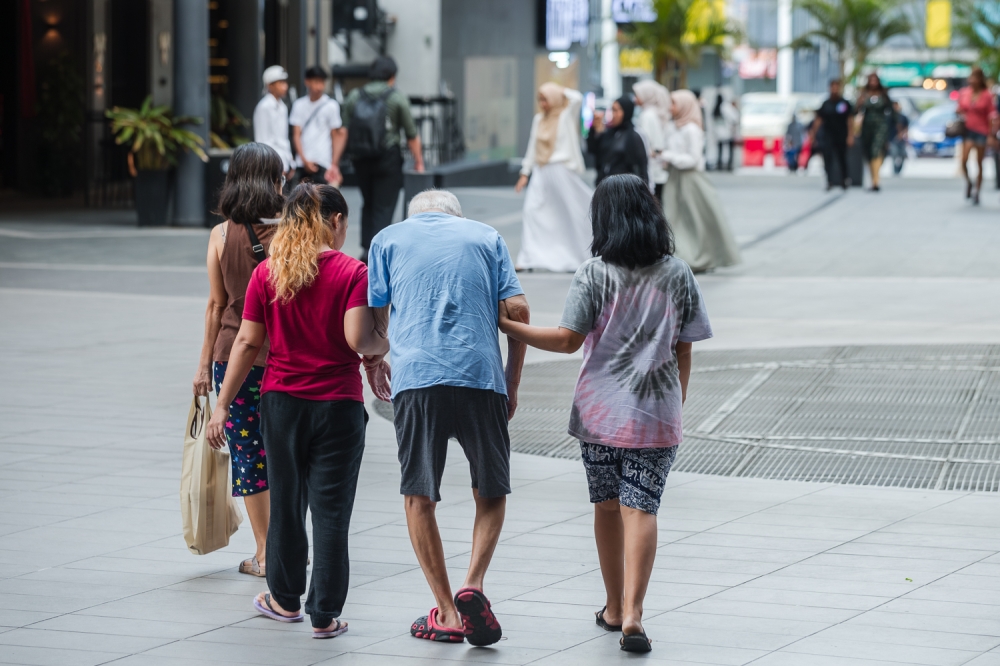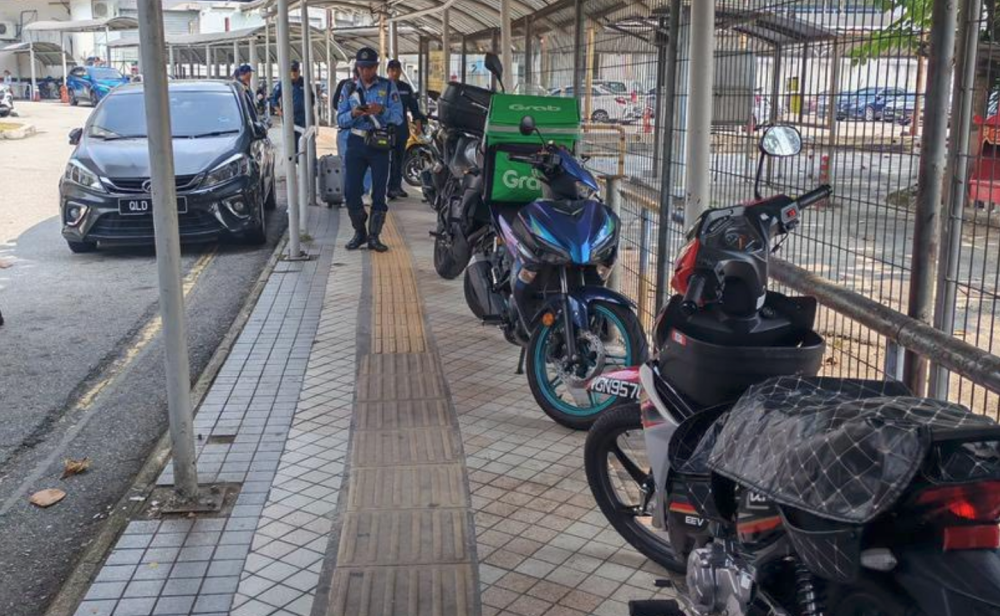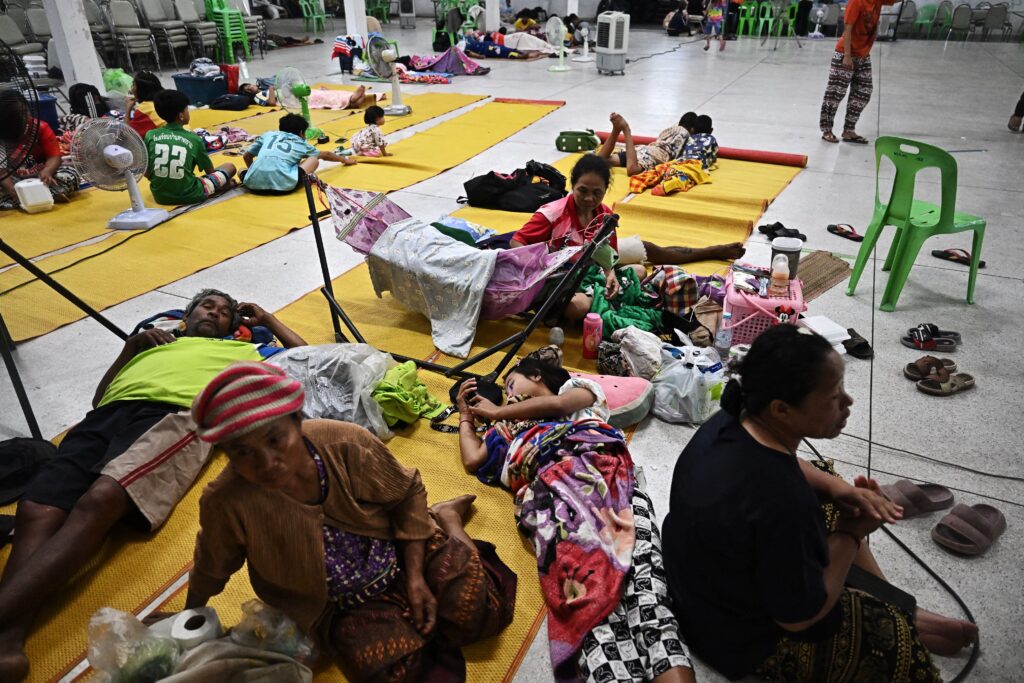KUALA LUMPUR, July 24 — The term ‘sandwich generation’ refers to a group of middle-aged adults who are simultaneously caring for their own children and their ageing parents.
They are essentially caught – or ‘sandwiched’ – between the responsibilities of supporting two different generations, including providing physical, emotional, and financial support.
In Malaysia, most caregivers are informal or family members and according to the Department of Statistic Malaysia (DoSM) Labour Force Survey in February 2024, there are 7.23 million persons recorded as being outside the labour force, with the main reason being housework or family responsibilities.
Keep in mind that there are also working individuals who take on a ‘second shift’ as caregivers after their regular working hours.
Malay Mail has reached out to several caregivers, including those with special needs children, to share some of their experiences in providing care for their loved ones.
A caregiver’s journey
Liew Chooi Mei is a mother of two children and has been an active volunteer for counselling NGO, Life Line Association Malaysia (LLAM), since 2014.
Her mother, who had dementia, passed away in the same year she began volunteering at LLAM, just 14 years after her late father, who died of cancer.
Both parents were cared for by Liew and her two siblings, who took turns caring for them.
Liew admitted that her experience caring for her late mother was not a pleasant one and left her with regrets.
This was partly due to her mother’s worsening condition at the time, which eventually pushed Liew to her limits – leading to moments where she accidentally scolded her mother and even took to harming herself.
“Because we were not trained caregivers and we also get overwhelmed by our emotions. I thought I was good enough to take care of her because I used to work as a kindergarten teacher where I would normally take care of up to 30 children in a class sometimes.
“So I thought I had the patience but when dealing with my mom, especially after the hurtful things she said and the way she treated me – my patience just left me.
“Eventually I understood that was the dementia talking and she was not her true self, it changed her to a totally different person,” Liew said.
During her caregiving journey, Liew mentioned that the counselling at LLAM has helped her a lot, especially in sharing her troubles. She felt luckier than others because she had a space to express herself and unload her emotional baggage while caring for her mother.
She is now serving as the division leader for LLAM’s public awareness programmes, continuing her mission to help caregivers provide quality and empathetic care through her numerous talks and seminars.
She also shared a few pointers for caregivers:
- Let them talk and listen to what they have to say – Some might have something important to say, so it’s important to lend them your ear
- While medication is one thing, taking the people you care about to some leisure activities could help lighten their mood
- Only a healthy caregiver can provide quality care – It is important for caregivers to take care of themselves first before taking care of others
- Caregivers may be limited by resources, so don’t judge whether your actions are right or wrong – Your limits may hold you from giving your best to your family
- Getting respite care or sending your parents to daycare does not mean you’ve failed as a caregiver – It’s okay to get some assistance
Fulfilling yet demanding work
Nurain Saiful Ahmad, 39, currently works at the Ministry of Foreign Affairs in Putrajaya as an administrative and diplomatic officer. She is also a mother of two children, aged 12 and 14.
In addition, she and her five siblings are caring for their parents. Her father, 69, has diabetes, high cholesterol, and hypertension, while her mother, 64, suffers from the same three illnesses and was diagnosed with bipolar disorder at the age of 32.
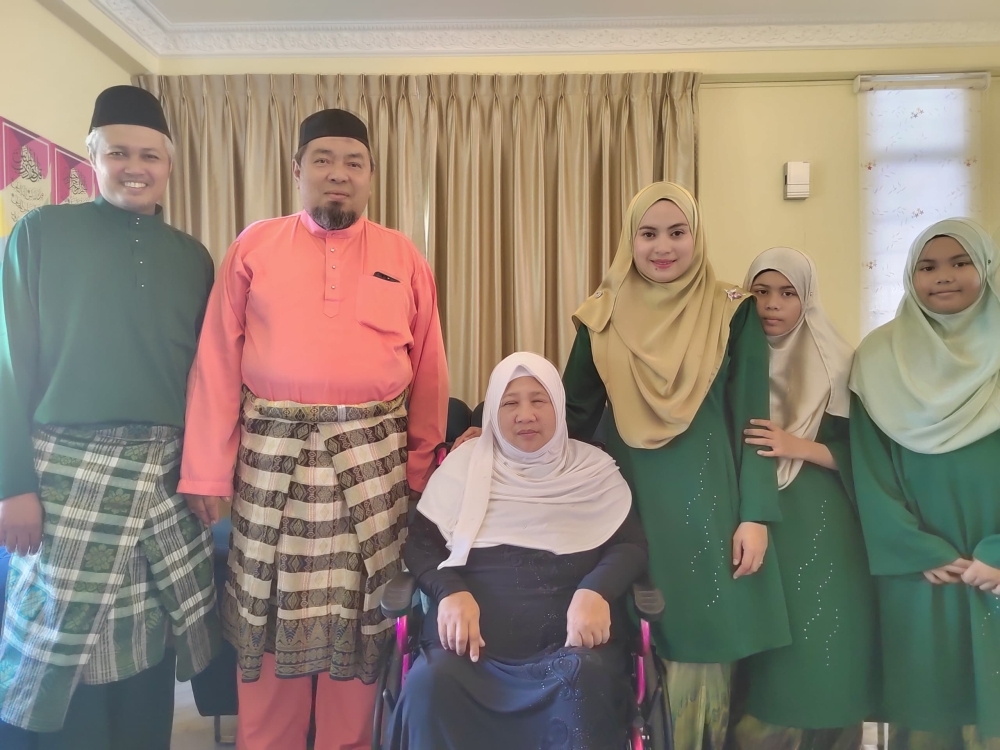
Nurain Saiful Ahmad (third from right) with her family. — Picture courtesy of Nurain Saiful Ahmad
In 2021, her mother’s condition worsened after being diagnosed with Parkinson’s disease, which left her wheelchair-bound and in need of close monitoring.
Both of Nurain’s parents are staying with her elder sister in Lenggeng, Negeri Sembilan and she would normally visit them twice a month.
Although her elder sister is the primary caregiver, Nurain and her other siblings take turns visiting and caring for their parents, especially during Hari Raya or whenever their elder sister is unavailable or in need of a break.
Nurain, who considers herself to be in a better financial position compared to her other siblings, spends around RM1,500 monthly on her parents’ needs, including the monthly car loan payment for her father’s vehicle, adult diapers, insulin needles, and more.
She added that she volunteers her financial support because she doesn’t want to burden her other siblings, especially the younger ones – her brother recently got married in May, while her youngest sister is still in the process of becoming financially independent.
However, for more expensive medical needs and equipment, they usually divide the cost among themselves.
“I love taking care of both my parents and my children and at the same time, I am teaching my children to be independent which has been very helpful for both my husband and I.
“I feel like it’s an honour to be able to provide basic needs to others and you know this is what you signed up for when you decide to get married and have children while your parents are ageing.
“I have never regretted this and I will continue to care for them for as long as I breathe. In fact, I even plan to volunteer at hospitals when I retire because I love taking care of sick people and I believe that you are at your most vulnerable state when you’re sick and whatever help or assistance that you can get, would really support you to get through those difficult times,” Nurain said.
When it comes to juggling her time between work, caring for her children, and looking after her parents, Nurain and her husband practice effective communication.
For example, if she is too tired, her husband steps in for the rest of the day, and she returns the favour by covering for him the next day.
Both Nurain and her husband utilise the calendar app on their phones – even to schedule 10 minutes of ‘pillow talk’, because they understand that even a short time together can make a big difference.
Although her time is limited by her commitments, Nurain still manages to allocate some ‘me time’ for herself, whether it’s taking a long nap, going for a walk in the park, or simply sitting in her reading chair at home.
Her go-to activities also include playing badminton every Tuesday and karaoke, which she can easily do during her drive to work.
Bittersweet acceptance
Cason Ong Tzse Chun is 56 years old this year and is caring for his two special needs children with his wife, while also looking after his parents and an uncle.
His daughter, 28, was diagnosed with developmental delay, while his son, 27, has autism.

Cason Ong Tzse Chun and his family. — Picture courtesy of Cason Ong Tzse Chun
Ong officially retired from his family’s paper roll supply business in 2019 to spend more time with his children. He and his wife now run a small-scale homemade food business together to make ends meet.
He is also active in volunteering with various organisations including serving as the National Autism Society Malaysia (Nasom) honorary secretary and Kiwanis Club Petaling Jaya’s president.
Speaking to Malay Mail, Ong said that his sister can be considered the primary caregiver for their parents, as they live closer to each other. However, Ong often takes turns with her to bring their parents to their medical appointments.
Ong also takes care of his uncle, who previously lived alone but is now in a nursing home – a favour for his aunt, who is currently living in Singapore.
Compared to what he has been through in the past, Ong describes his life as relatively smoother now.
He recalled that he and his wife were expecting again a few years after their son was born. However, they made the decision to abort out of fear that their newborn wouldn’t be able to live a quality life.
“You see, I already have two children with special needs, and let’s say the third one came out normal – don’t you think his or her life would be more stressful, having to take care of their brother and sister? The child would have no life,” he said.
Sharing more about his children, Ong said that his son is currently working two part-time jobs, one of which is at a local speech therapy office in Puchong. He works as a general worker every Tuesday and Thursday from 9am to 5pm.
For the rest of the weekdays, he would work as a part timer at a restaurant which is owned by Ong’s friend for about five hours per day.
He also takes his daughter to the Lovely Disabled Home in Petaling Jaya on weekdays. The home is an NGO that provides job opportunities to physically and mentally challenged individuals aged 18 and above.
The reason Ong encourages his children to work is not only to teach them how to earn a living and be independent, but also to help them adapt to the working environment. He sees it as valuable training, especially for his daughter, who has difficulty with fine motor skills.
Patience and perseverance
Caregiving is not just demanding work; it also requires a lot of patience, empathy, and, most of all, perseverance. It continues until the end.
This is how 69-year-old Dorothy George Dass described her journey in raising her now 24-year-old son, Abraham Isaac Pereira, who was diagnosed with autism when he was six years old.
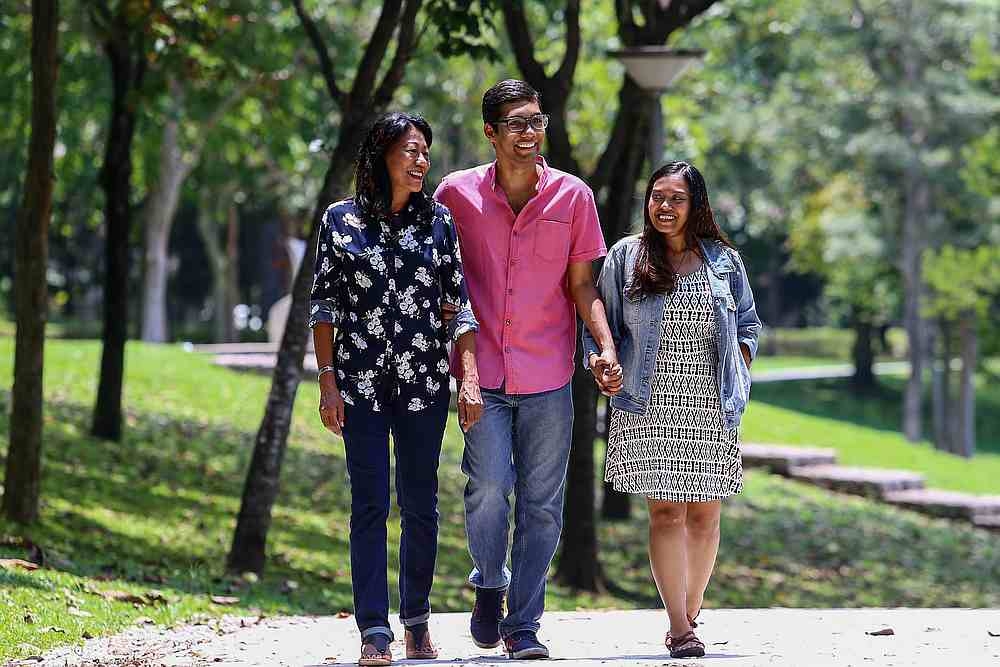
Abraham Isaac Pereira (centre) together with his mother Dorothy George Dass (left) and his sister Denise Frances. — Picture by Hari Anggara
Despite being on the autism spectrum, Abraham holds a diploma in Automotive Engineering and is currently working as a mechanic, with a lifelong dream of working for an F1 team in the future.
This all did not happen overnight, Dorothy shared. It required a lot of repetitive work and hours of behavioural therapies which they managed to get at Nasom.
“There were a lot of frustrations in teaching, there’s a lot of repetitive work.
“We couldn’t just leave what we’ve learned from the teachers and therapies at the centre, we have to bring it home and continue it.
“We just have to keep repeating ourselves until he gets it right,” Dorothy said.
Dorothy, who works as a senior operations admin at a local vending machine supplier company, added that she is grateful to have had employers who were very understanding of her situation.
This was especially true when she had to go back and forth between dropping her son off at school and being present at some of his therapies and activities at Nasom, including choir classes and performances.
* If you are lonely, distressed, or having negative thoughts, Befrienders offers free and confidential support 24 hours a day. A full list of Befrienders contact numbers and state operating hours is available here: www.befrienders.org.my/centre-in-malaysia. There are also free hotlines for young people: Talian Kasih at 15999 (24/7); Talian BuddyBear at 1800-18-2327(BEAR)(daily 12pm-12am); Mental Health Psychosocial Support Service (03-2935 9935 or 014-322 3392); Life Line Association Malaysia helpline at 15995 and Jakim’s Family, Social and Community Care Centre (WhatsApp 0111-959 8214).


